After surviving a devastating explosion while working in Singapore, former migrant worker Rahman Mohammad Ataur has been chasing his dream of helping youths in his hometown in Bangladesh do what he never could — go to school.
Today, the former migrant worker is the driving force behind Al-Shohag Kindergarten, a school he started in Bangladesh three years ago.
After opening a school for kindergarten and primary school children, he now hopes to open a secondary school. All in all, his two schools will provide a comprehensive 12-year programme for underprivileged young people in his village.
Surviving the accident
In 2016, an explosion at his workplace left the then-21-year-old Rahman with burns on over 73 per cent of his body. After emerging from a three-month-long coma, a long and painful recovery followed.
The incident occurred just a year after he first arrived in Singapore, a process that saw him spending S$16,000 to secure a job and for mandatory "courses" he says taught irrelevant skills.
Burdened by debt and alone in a foreign land, Rahman eventually found solace in the nurses and doctors who cared for him.
Another pillar of his support system was volunteers from HOME (Humanitarian Organisation for Migration Economics).
When Rahman’s former company defaulted on his medical bills, the non-governmental organisation stepped up.
To this day, he makes time to meet HOME volunteers whenever he visits Singapore from Bangladesh.
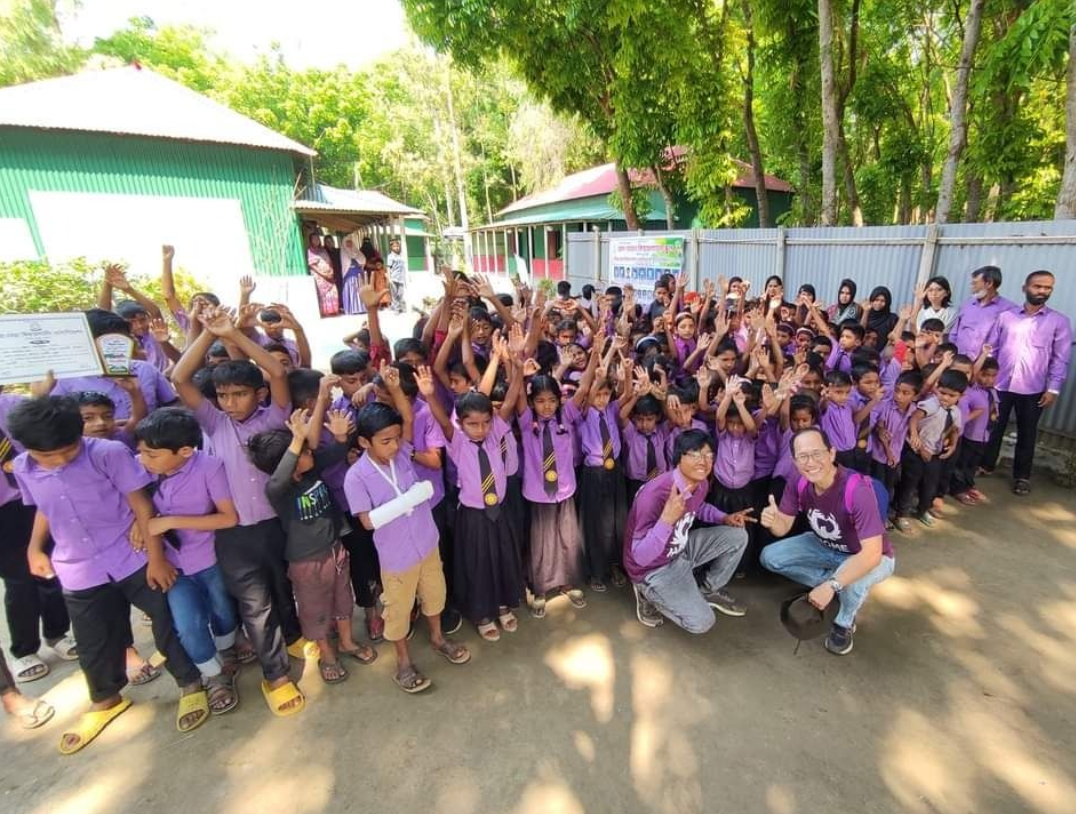 HOME volunteers visiting Al-Shohag. Photo courtesy of Mohammad Ataur Rahman
HOME volunteers visiting Al-Shohag. Photo courtesy of Mohammad Ataur Rahman
Opening a school
After receiving compensation of S$137,451.30 for permanent incapacity, Rahman decided to start a school in his village.
As a child, he dreamed of continuing his formal education in secondary school — a dream that was dashed when his parents needed an extra pair of hands to provide for the family of six.
During Rahman’s short stint in primary school, he said teachers could go years without learning their students’ names. He was determined to make his school different.
After a year of preparation, Al-Shohag Kindergarten (meaning “Allah’s Love”) opened its doors to 211 students on Jan. 1, 2020.
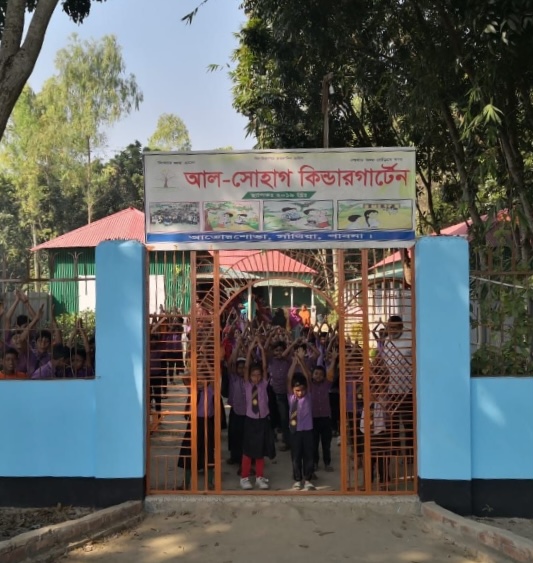 Al-Shohag Kindergarten. Photo courtesy of Mohammad Ataur Rahman
Al-Shohag Kindergarten. Photo courtesy of Mohammad Ataur Rahman
Thoughtfully designed curriculum
Rahman’s school is the only one in his village which offers kindergarten-level and computer literacy classes.
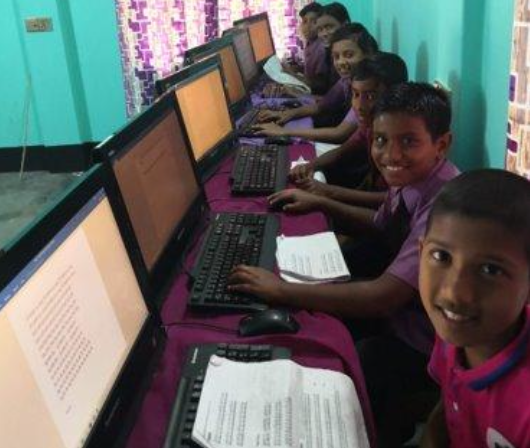 Students attending computer classes. Photo courtesy of Mohammad Ataur Rahman
Students attending computer classes. Photo courtesy of Mohammad Ataur Rahman
The school prides itself on its unique emphasis on computer and English literacy, as well as close teacher-student relationships. Rahman hopes imparting these valuable skills will help his students land better-paying jobs which pull them out of cycles of poverty.
Rahman says he modelled the curriculum after some schools he visited in Singapore. One example is how Al-Shohag has “sports days” to ensure students are physically fit and activities that teach students about their heritage and culture.
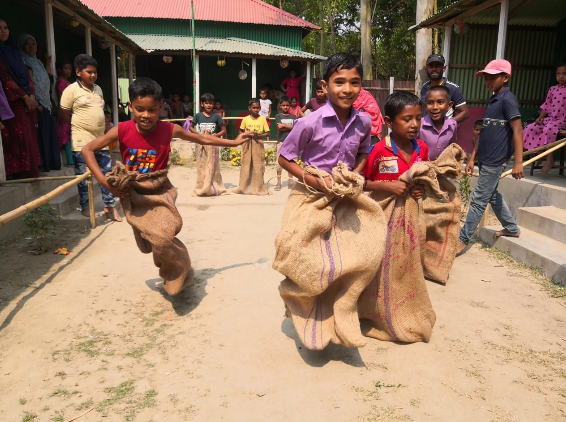 Al-Shohag's sports day. Photo courtesy of Mohammad Ataur Rahman
Al-Shohag's sports day. Photo courtesy of Mohammad Ataur Rahman
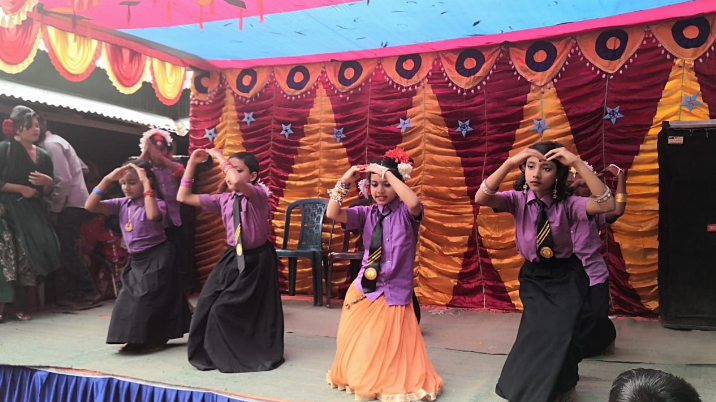 Children performing at the school. Photo courtesy of Mohammad Ataur Rahman
Children performing at the school. Photo courtesy of Mohammad Ataur Rahman
Rahman recognised the need to convince parents of the importance of formal education, so Al-Shohag also reaches out to parents via an annual Meet-the-Parents Day.
The thoughtfully designed programmes have paid off. Not only did Al-Shohag students achieve outstanding exam outcomes compared to other schools in the region, but 90 per cent of the kindergarten-aged children in Rahman’s hometown are also enrolled in Al-Shohag.
According to Rahman, these are impressive numbers for an agricultural community which does not place much emphasis on formal education.
Keeping Al-Shohag afloat
Rather than making the school free, Rahman charges a small fee, hoping it will make parents more accountable since they are putting some of their own money into their children’s education.
For six months of school, the standard fees are 200 Taka (S$2.80) for each student. Even this, Rahman says, can be steep for many families. About 15 per cent of his students pay half of that, or nothing at all, because of their difficult circumstances.
Rahman’s drive to simply “help others” means he does not turn students away — he still forks out the cash to sponsor their school materials.
Naturally, the token school fees are nowhere close to covering the school’s operational costs, which range from S$1,000 to S$1,500 monthly — most of which go towards teachers’ salaries.
One-off donations from benefactors initially helped to keep the school afloat, but those are drying up too. Renting land for the school also means Al-Shohag is on borrowed time.
Five-year plan: a future secondary school
None of this changes the ambitious plans Rahman has for his school. In the next five years, he hopes to establish a secondary school with a five-year programme developed with the same goals in mind — to improve English and computer literacy in the village’s youths.
Further down the line, he hopes to increase student enrollment to over 1,000 students. Rahman’s long-term goal is to permanently move Al-Shohag and the future secondary school to a piece of land he has already bought.
When asked if he wanted to continue his dream of furthering his own education, Rahman replied that he’s learning every day.
Even through a traumatic recovery, he has improved his English greatly and picked up basic computer skills. A slide deck detailing the school’s cash flow in 2022 also shows off his newest skill — accounting.
This achievement made all the more impressive considering his road to recovery is still incomplete. Rahman returns to Singapore regularly for medical procedures and operations related to his 2016 injury.
So though he may never attain the paper certificates many are privileged to pursue, his love for education means his dream lives on in the hundreds of students who will benefit from Al-Shohag.
If you would like to contribute to Rahman’s school, donations can be made to:
Name: Mohammad Ataur Rahman
Bank Name: Islami Bank Banglagesh Limited
Branch Name: Kashinatpur Bazar, Santhia, Pabna.
Account Number: 20501650203273804
Phone Number: 01859212746
For donations via PayNow, please email [email protected]. A local trustee's Paynow details will be provided.
Top photo by Ethan Ong and Mohammad Ataur Rahman
If you like what you read, follow us on Facebook, Instagram, Twitter and Telegram to get the latest updates.



